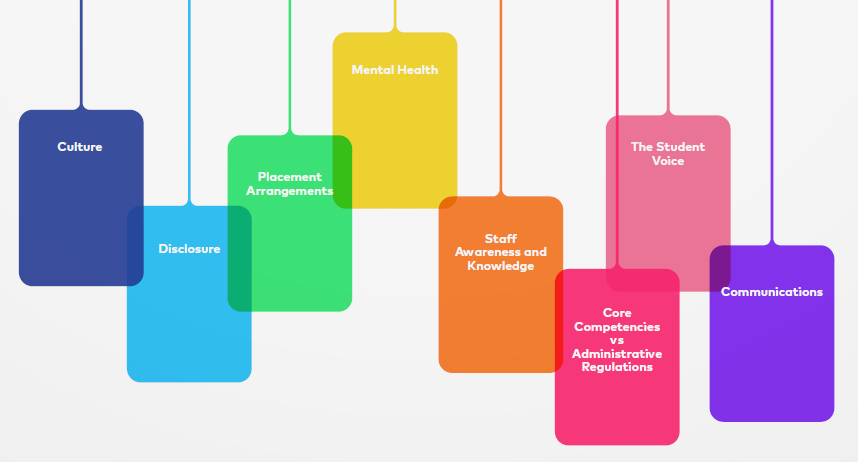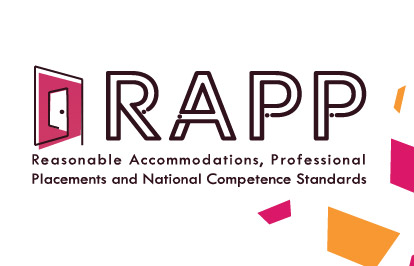Research & Guidance on Students with Disabilities on Placement
AHEAD and the Disability Advisors Working Network are delighted to release ‘Students with Disabilities on Placement: Guidance on the Provision of Reasonable Accommodations on Practice-based Placements in Professionally Accredited Programmes’.
This HEA funded publication developed by AHEAD in partnership with DAWN and under the guidance of a national steering group, is the culmination of 18 months of research and consultation involving staff and students from 28 further and higher education institutions, national organisations, placement providers and professional bodies.

AHEAD research has consistently found that students with disabilities are underrepresented in fields such as ‘Education’ and ‘Health and Welfare’, where most programmes are professionally accredited by a professional body and involve the completion of on-site professional placements. Additionally, issues around the professional placements involved in these courses were repeatedly cited to AHEAD and DAWN as a persistent barriers to success for students with disabilities in the professions.
AHEAD and DAWN therefore established the following research objectives:
- Research and review barriers and examples of good practice to allow students with disabilities to achieve course competency standards in an appropriate manner
- Produce national guidance, including examples of good practice, to provide clarity and support on the application of reasonable accommodations in national competency-based courses.
Key themes emerged from the research process (seen below) and guidelines and recommendations were derived from this. More information about the research process and stages of the project can be found here.
Who is this report for? This guidance is intended to support a range of professionals including managers with responsibility for diversity and inclusion, quality improvement or course development and delivery; deans of schools/faculties; course leaders; preceptors; placement co-ordinators in both Higher Education Institutions (HEIs) and placement locations; disability service staff; and student union officers.
Get the Students with Disabilities on Placement Report & Guidance

Themes Arising
From the research, key themes emerged which are explored in depth within the report, with recommendations made under each theme:
- Equality legislation
- Disclosure
- Placement challenges and good practice
- Creating a culture of success and inclusion
- Role of professional bodies and other statutory bodies
- Mental health
This is followed by discussion of the Further Education and Training entry pathways to access professional courses which include practice placements.
A summary of key findings and recommendations are as follows:
Summary of Key Findings
Amongst the key findings are that:
- A majority of students with disabilities who participated had a positive experience of professional placement, but a majority also experienced barriers to the completion of their placement.
- A majority of participating students had concerns about disclosing their disability, and in some professions, there was evidence of a culture of non-disclosure due to worries about impacting upon career progression.
- Students identified strong feelings of anxiety about placement arrangements before and whilst on placement, and difficulties accessing mental health supports out of hours whilst on placement. Student mental health was also raised as a particular concern for participating staff who had identified high levels of student anxiety during the placement process.
- Students valued a supportive placement environment open to discussion and provision of reasonable accommodations. They appreciated staff with a high level of disability awareness, and HEIs and placement providers with inclusive practices supported by clear structures.
- It was evident from both students and staff that there was a lack of clarity on the difference between the administrative rules regarding placement and the actual core competencies required by the professional body, resulting in student confusion.
- Participating staff believed that changes made during the COVID-19 pandemic resulted in more inclusive teaching practices and had created a more empathetic environment towards disability within education and work.
- Student feedback was deemed essential to good decision making. There was general agreement however that limited arrangements existed for gathering student feedback during and post placement.
- Professional bodies were identified as playing an important role and the majority believed that they should have an active role, in partnership with HEIs and placement locations, in developing and promoting new policies concerning reasonable accommodation.
- The majority of staff considered assistive technology (AT) an important resource and reported that a lack of a clear policy on the use of AT in the placement environment created stress and anxiety for students.
Top 8 Key Recommendations
Although there are many recommendations contained within this report, a summary of the top 8 are as follows:
- HEIs should implement a clear strategy to create a safe disclosure environment for students with disabilities, and take responsibility for sharing these strategies with placement providers with the intention of creating similar safe disclosure environments on placement.
- All HEIs running professional courses should have published policies on placement arrangements, including a pre-placement planning process which identifies all the key players in selection of placements and provision of reasonable accommodations for disabled students.
- Academic staff and disability services in HEIs, together with placement providers, should consider a more collaborative and rigorous process on collaboratively developing pre-planning processes and documentation, to ensure placement reasonable accommodations are fully identified and implemented in a timely manner.
- Placement providers should enter into discussions with HEIs on policy and practice on current and future provision of Assistive Technology and its use as part of the reasonable accommodations available on professional placements, in order to prevent disability discrimination.
- HEIs should review how student feedback is gathered, used and prioritise listening to the student voice in decision-making and leadership across the whole institutional community and placement environment.
- Professional bodies should review their procedures and communications to reflect clearly their duties and responsibilities under Section 42 of the Public Sector Equality and Human Rights Duty 2014. Professional bodies should develop communications relevant for disabled staff and potential and current students with disabilities, with examples of how a competence standard may be met through flexible arrangements.
- HEIs should develop and publicise comprehensive information and support services for all students engaging in practice placements, especially including out-of-hours services.
- HEIs, placement providers and professional bodies should work towards creating a coordinated multi-agency approach to promote positive student mental health during all practice-based professional placements.
Get the Students with Disabilities on Placement Report & Guidance



.jpg)



